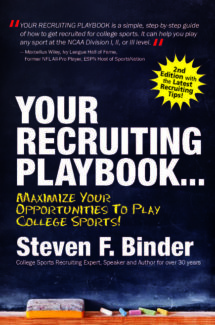
About Steven Binder

This playbook is for student athletes, but it also offers useful information for their parents, high school and travel team coaches, and guidance counselors. They play valuable roles in helping student athletes recruit themselves, and I’ll tackle those roles in greater detail throughout the book.
It’s ideal to start the process in your freshman or sophomore year. The earlier you start, the more time you have to connect with college coaches and build relationships to better your chance of being recruited. If you are a junior or senior and you haven’t started recruiting yourself yet, not to worry. While an earlier start is ideal, there are still many ways to make yourself an attractive candidate to both coaches and admissions counselors. For the juniors and seniors, start by reading Chapter 9: Streamlining the Process, discusses jump starting to your recruiting process.
No. Virtually all colleges reserve spots in the admissions process for their sports teams for almost every sport.
This book will help the student athlete who is being recruited as much as the one who is not! No student athlete is recruited by every school that would be a suitable match. This playbook can help you expand the pool of colleges that SHOULD consider you.
Those services can be a help to some student athletes, but they are by no means absolutely essential, nor do they eliminate the need to recruit yourself. While they can act as a nice supplement, nothing replaces the personal contact and relationship building that is required, and necessary, to set yourself apart from other athletes.
Highlight & full game video will be key in your recruiting process. A college coach needs to see your game video & grades. They need to determine if you are a good student & fit for the school & a player that can help them win. Plus, are you a good teammate, coachable and care enough about training to improve for the college level?
The chances of playing college sports after high school is around 3% to 6%.
Plus, the percentage of high school student-athletes receiving a scholarship to play any NCAA Division I sport is about 1%. You need the information & tools to market yourself…Your Recruiting Playbook…Maximize Your Opportunities To Play College Sports can be your guide to a successful recruitment.
Your coach’s ultimate responsibility is to develop your skills, but will NOT be in charge of getting you recruited. Your talents and academics will be the biggest factors in the recruiting process, but it helps to have your travel or high school coach as a recommendation for you. You have to own the communication process with college coaches.
READ A FREE SAMPLE OF "YOUR RECRUTING PLAYBOOK..."
MEDIA & OPINIONS
Q&A WITH EXPERT STEVEN BINDER
COMMUNICATING WITH COLLEGE COACHES
FINALIZING YOUR LIST OF SCHOOLS
The Importance of a Plan in Life & in the College Sports Recruiting Process
Thinking About Playing at the Next Level – Gaining Knowledge
RECRUITING TALK WITH MARK VILLELLA
LIVE SPEAKING EVENT
GET RECRUITED TO PLAY COLLEGE SPORTS
Award winning author and college sports recruiting expert, Steven Binder, speaks nationally to provide information on “How-To” get recruited for college sports. Steven is a featured expert for ESPN, WFAN and the New York Times.
- 75 minute interactive presentation and lively Q&A session with student athletes, coaches, teachers and administrators at your school or event.
- Receive a step by step plan for the recruiting process & learn how to recruit yourself. Learn how to get college funded.
- Also included: NCAA Student-Athlete Recruiting Guides

The following 7 topics will be discussed in-depth & ideas will be given so you can take immediate action
- How to determine the best college fit for the student athlete.
- How to get noticed and be recruited by college coaches in your sport.
- The process of choosing the right college so the student athlete can benefit from a strong academic and athletic experience, and position themselves for a successful career after college.
- High school student athletes, parents and coaches need to take a proactive approach to recruiting. College coaches will not be able to see every player, and because of that, not a lot of talented players will have the opportunity to become a collegiate athlete. The true difference maker is recruiting yourself - make the coaches notice you.
- Getting college funding: options, financial aid, scholarships, myths vs. realities… Be informed so you are better prepared to get what you want.
- Relationship building with college coaches, admissions officers and how to utilize your high school guidance counselor better. You will be given useful tips and information that will allow you to be more successful with these important people who are key in the process.
- Plus, an interactive question & answers session, so you feel comfortable with the information you learned to proceed.